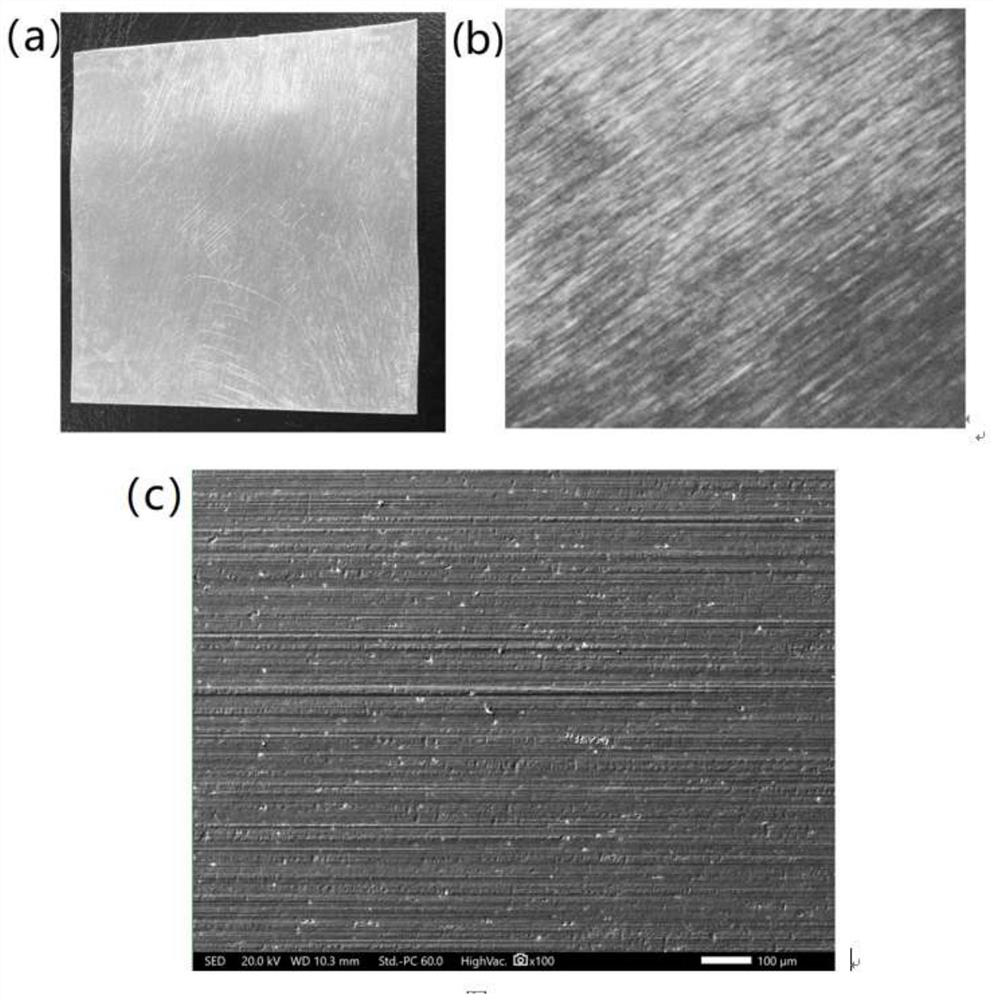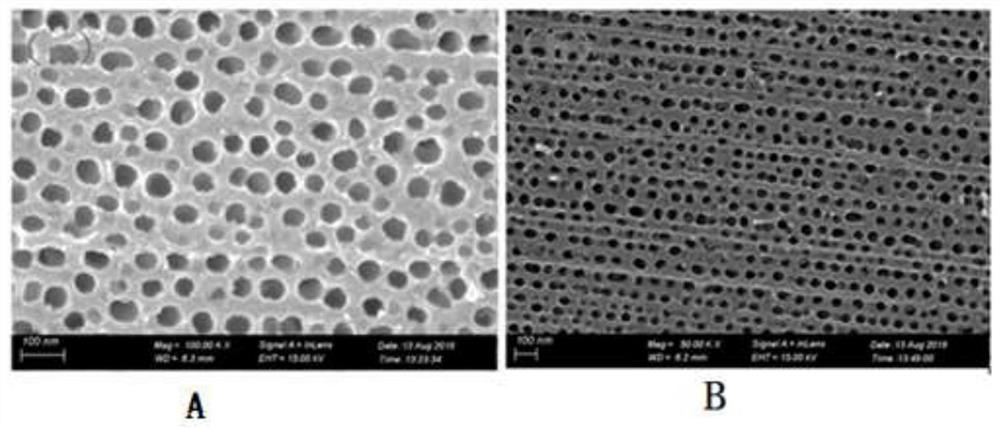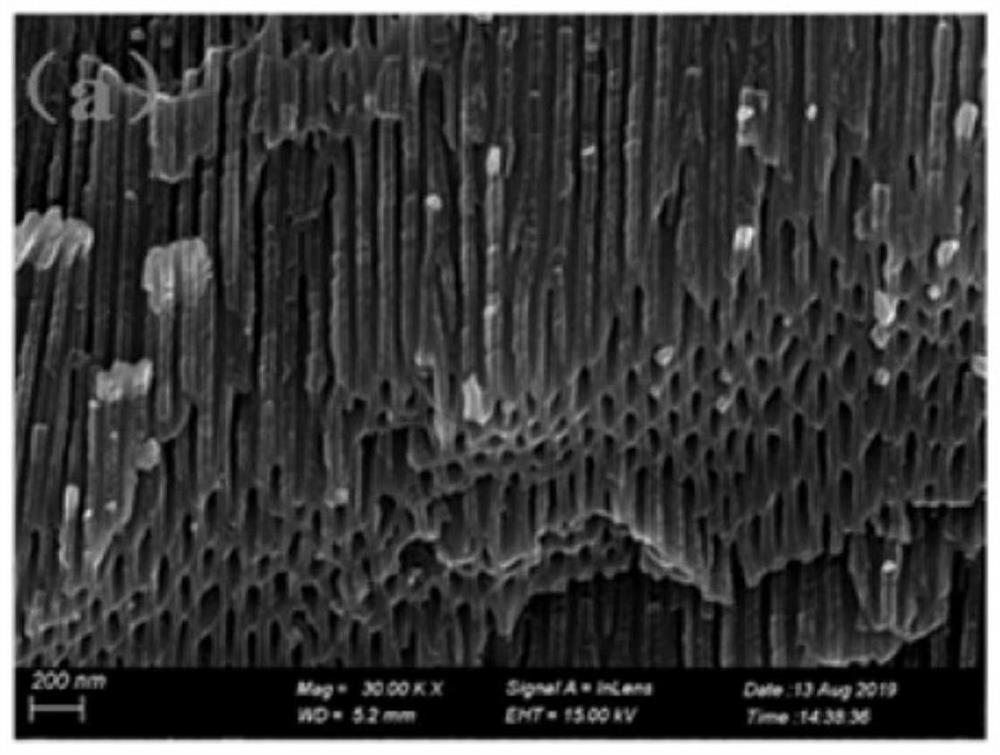Two-dimensional catalytic material and preparation and application thereof
A technology of catalytic materials and two-dimensional materials, which is applied in the field of two-dimensional catalytic materials and their preparation and application, can solve problems such as fragility and difficult material recovery, and achieve convenient separation and recovery, high separation and recovery efficiency, good mechanical properties and The effect of structural stability
- Summary
- Abstract
- Description
- Claims
- Application Information
AI Technical Summary
Problems solved by technology
Method used
Image
Examples
preparation example Construction
[0129] Fabrication of hole arrays on the surface of transition metal foils
[0130] Any existing technology can be used to form a hole array (nano-scale and / or micron-scale pores) on the surface of the transition metal foil, for example, the publication (announcement) number: CN103402908B publication (announcement) date: 2016.08.31 patent The document discloses methods for producing highly ordered nanopillar or nanopore structures over large areas, such as anodization.
[0131] In some embodiments, after the "transition metal foil with concave-convex stripes on the surface" is treated by a conventional anodic oxidation method, nanoscale and / or micron array of apertures.
[0132] In some embodiments, the transition metal foil is used as the anode to connect to the positive electrode of the external power supply and placed in the electrolyte solution. The cathode can be selected from Pt sheet, titanium plate, stainless steel, stone grinding rod, etc., which are not easy to reac...
Embodiment 1
[0140] In this example, an aluminum foil with a thickness of 200 μm is selected as the basic material for the preparation of a two-dimensional base material. The surface before polishing is as follows figure 1 a; the specific steps are as follows:
[0141] 1) Pretreatment: The aluminum foil (upper and lower surfaces) is pretreated by degreasing, grinding, wire drawing, and washing. Acetone solution is used for degreasing, and ethanol and deionized water are used for cleaning. After completion, dry it in an oven at 50°C for later use. The comparison picture after treatment is shown in 1b;
[0142] 2) Anodizing: use titanium plate as cathode, pretreated aluminum foil as anode, 50g / L oxalic acid solution (take 300ml) as corrosion electrolyte, and the reaction of corrosion electrolyte in the process of anodization The container has been placed in an ice-water bath, and the temperature is kept at 10±1°C; during anodic oxidation treatment, the distance between the positive and neg...
Embodiment 2
[0156] In this embodiment, a two-dimensional transition metal tin foil with a thickness of 300 μm and concave-convex stripes (the stripe width is about 60nm, the stripe depth is 4nm, and the stripe spacing is 60nm) is selected as the base material for the preparation of the base material. The steps are as follows:
[0157]1) Pretreatment: The two sides of the tin foil are pretreated by degreasing, grinding, drawing, and washing. Acetone solution is used for degreasing, and ethanol and deionized water are used for cleaning. After completion, dry it in a 50°C oven for later use;
[0158] 2) Anodizing: use titanium plate as cathode, pretreated tin foil as anode, 150g / L sulfuric acid solution (take 300ml) as corrosion electrolyte, and a reaction vessel with corrosion electrolyte in the process of anodization Keep it in an ice-water bath and keep the temperature at 10±1°C; during anodic oxidation treatment, the distance between the positive and negative electrodes is 1cm, the volta...
PUM
| Property | Measurement | Unit |
|---|---|---|
| thickness | aaaaa | aaaaa |
| specific surface area | aaaaa | aaaaa |
| thickness | aaaaa | aaaaa |
Abstract
Description
Claims
Application Information
 Login to View More
Login to View More - R&D
- Intellectual Property
- Life Sciences
- Materials
- Tech Scout
- Unparalleled Data Quality
- Higher Quality Content
- 60% Fewer Hallucinations
Browse by: Latest US Patents, China's latest patents, Technical Efficacy Thesaurus, Application Domain, Technology Topic, Popular Technical Reports.
© 2025 PatSnap. All rights reserved.Legal|Privacy policy|Modern Slavery Act Transparency Statement|Sitemap|About US| Contact US: help@patsnap.com



